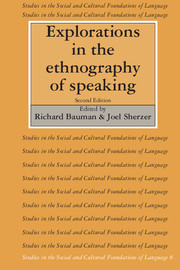Book contents
- Frontmatter
- Contents
- INTRODUCTION TO THE SECOND EDITION
- I PREFACE AND INTRODUCTION
- II COMMUNITIES AND RESOURCES FOR PERFORMANCE
- III COMMUNITY GROUND RULES FOR PERFORMANCE
- IV SPEECH ACTS, EVENTS, AND SITUATIONS
- Introduction
- 8 Strategies of Status Manipulation in the Wolof Greeting
- 9 Rituals of Encounter among the Maori: Sociolinguistic Study of a Scene
- 10 Speaking of Speaking: Tenejapa Tzeltal Metalinguistics
- 11 Black Talking on the Streets
- 12 Namakke, Sunmakke, Kormakke: Three Types of Cuna Speech Event
- 13 The Concept and Varieties of Narrative Performance in East European Jewish Culture
- V THE SHAPING OF ARTISTIC STRUCTURES IN PERFORMANCE
- VI TOWARD AN ETHNOLOGY OF SPEAKING
- Notes
- References
- Index of names
12 - Namakke, Sunmakke, Kormakke: Three Types of Cuna Speech Event
Published online by Cambridge University Press: 05 June 2012
- Frontmatter
- Contents
- INTRODUCTION TO THE SECOND EDITION
- I PREFACE AND INTRODUCTION
- II COMMUNITIES AND RESOURCES FOR PERFORMANCE
- III COMMUNITY GROUND RULES FOR PERFORMANCE
- IV SPEECH ACTS, EVENTS, AND SITUATIONS
- Introduction
- 8 Strategies of Status Manipulation in the Wolof Greeting
- 9 Rituals of Encounter among the Maori: Sociolinguistic Study of a Scene
- 10 Speaking of Speaking: Tenejapa Tzeltal Metalinguistics
- 11 Black Talking on the Streets
- 12 Namakke, Sunmakke, Kormakke: Three Types of Cuna Speech Event
- 13 The Concept and Varieties of Narrative Performance in East European Jewish Culture
- V THE SHAPING OF ARTISTIC STRUCTURES IN PERFORMANCE
- VI TOWARD AN ETHNOLOGY OF SPEAKING
- Notes
- References
- Index of names
Summary
Cuna society (in both San Blas and the interior Darien Jungle) is striking for vitality and richness in speech usage. From a formal or ceremonial point of view, there are many genres of speaking – chiefs' chants which deal with history, politics, and religion; formal speeches which are uttered by official and non-official individuals; long ikar which are used to cure diseases, hunt animals, make fermented drinks, and direct girls' puberty rites; and secret charms which enable an individual to have power over another individual or an object in nature. There is also a rich variety of non-ceremonial or colloquial genres – animal and plant stories, comical songs, lullabies, riddles, and linguistic games. Speaking ability at any level (from colloquial and conversational to formal and ceremonial) is highly valued and is a source of personal prestige among the Cuna.
It is not the purpose of this paper to deal in detail with all Cuna genres of speaking but rather to describe three basic patterns found in Cuna speech events and to discuss the constellations in speech usage that are associated with each of them. The three patterns are expressed most clearly in
the chanting and talking that occurs in the centrally located village congress house;
curing and related ikar;
kantur ikar which occurs during girls' puberty rites.
The three patterns will be investigated by means of descriptions of the events, focusing especially on the addressor, addressee, and the linguistic variety.
- Type
- Chapter
- Information
- Explorations in the Ethnography of Speaking , pp. 263 - 282Publisher: Cambridge University PressPrint publication year: 1989
- 7
- Cited by



